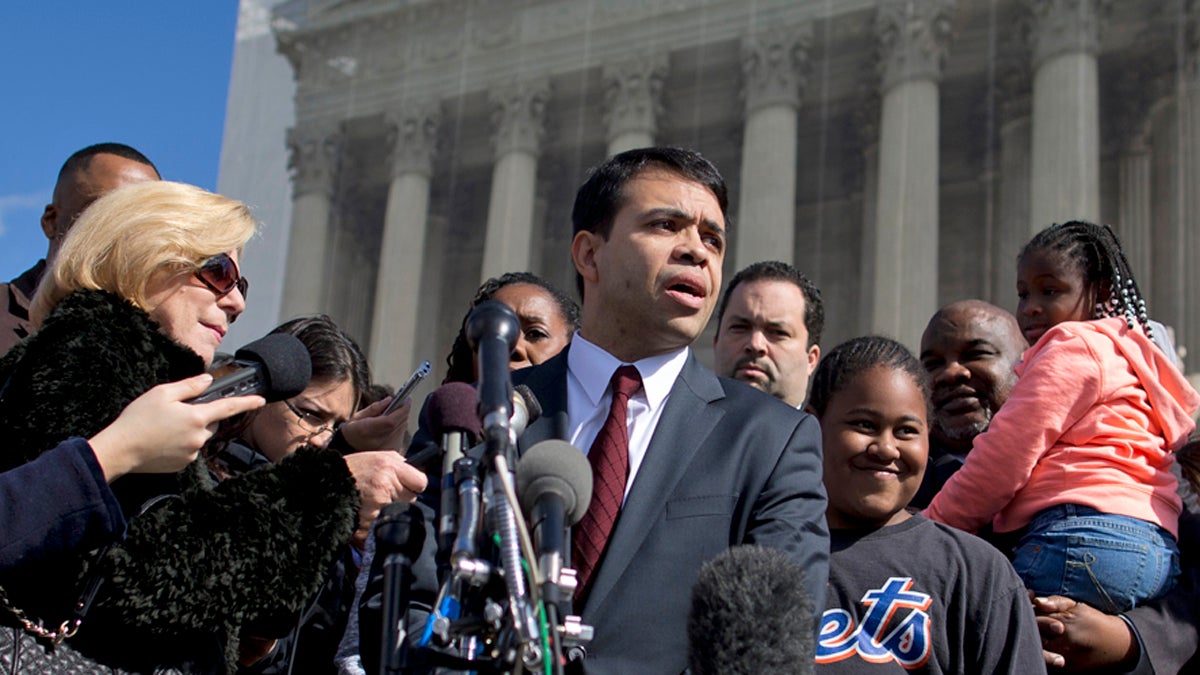Obama’s esteemed nominee was defeated for defending a bad guy

Debo Adegbile (center), special counsel, NAACP Legal Defense Fund, speaks with reporters outside the Supreme Court in Washington. (AP file photo/Evan Vucci)
Few people are more reviled than a cop killer. And woe to the attorney who defends the constitutional rights of a cop killer.
Which prompts this rhetorical question: Did President Obama really believe that he could successfully choose, as leader of the Justice Department’s Civil Rights Division, an esteemed litigator who helped file court briefs on behalf of a guy convicted of killing a Philadelphia cop? Was Obama really that naive, to actually believe that the intellect would trump the emotions in a Senate nomination fight?
As evidenced yesterday by the pivotal No votes of seven Democrats (goodbye, nominee Debo Adegbile), it was clear that a hallowed American principle, the constitutional right to counsel, didn’t mean squat. Nor did it matter that Adegbile was vindicated by the federal courts, which agreed with his contention that Mumia Abu-Jamal – while guilty as charged – didn’t belong on death row because of unconstitutional abuses at trial. But those kinds of nuances are lost when passions are inflamed. And nothing is more cowardly (hello, Delaware Sen. Chris Coons) than a politician who won’t stand up for a hallowed American principle.
Obama rightly denounced yesterday’s thumbs-down Senate vote as a “travesty,” but what else did he expect? Ever since Philadelphia cop Daniel Faulkner was slain in 1981, the Abu-Jamal case has been a visceral flash point and political football. Constitutional reasoning is no match for the Faulkner family’s grief or the rhetorical fury of the law enforcement community. Indeed, the cop groups describe Adegbile as somebody who “made his name defending one of the most notorious and unrepentant cop killers around.” See what I mean?
And politicians – especially those up for re-election – are generally terrified of being tagged as “anti-cop” or, worse yet, “soft on cop killers.” The TV attack ad writes itself.
Chris Coons, the Delaware Democrat, is up for re-election this year. Bear that in mind as you read his statement, which torturously explains why he voted to reject Adegbile’s nomination:
The vote I cast today was one of the most difficult I have taken since joining the Senate, but I believe it to be right for the people I represent. Last month, I voted in the Judiciary Committee to move his nomination to the Senate floor because I believed his nomination should be debated and considered by the full Senate. As a lawyer, I understand the importance of having legal advocates willing to fight for even the most despicable clients, and I embrace the proposition that an attorney is not responsible for the actions of their client.
The decades-long public campaign by others, however, to elevate a heinous, cold-blooded killer to the status of a political prisoner and folk hero has caused tremendous pain to the widow of Philadelphia police officer Daniel Faulkner and shown great disrespect for law enforcement officers and families throughout our region. These factors have led me to cast a vote today that is more about listening to and respecting their concerns than about the innate qualifications of this nominee.
Permit me to translate: “As a lawyer I know that everyone has a right to counsel, I know that Adegbile has ‘innate qualifications’ for the job, and I know that Abu-Jamal’s status in some lefty circles as a ‘folk hero’ shouldn’t influence my vote. But the heck with Adegbile’s qualifications. I don’t want to spend 2014 taking heat from cops and widows.”
You would think, listening to Adegbile’s critics, that he insisted the killer was innocent, and that he worked to free Abu-Jamal from jail. Nope. The truth was far more mundane. While Adegbile was acting head of the NAACP Legal Defense Fund in 2009, it filed briefs with the U. S. Supreme Court, contending (as did other legal groups) that the 1982 trial judge, in his jury instructions, had made it far too easy for jurors to render the death penalty. In fact, a federal appeals court in 2008 had already reached that same conclusion, ruling that Abu-Jamal didn’t belong on death row – and the swing votes were cast by Ronald Reagan appointees. And a year later, after Adegbile filed the NAACP legal briefs, the Supreme Court simply affirmed the appeals court ruling.
In a more rational political world, that explanation would’ve sufficed. After all, the Fourteenth Amendment to the U.S. Constitution declares in part that no state shall “deprive any person of life…without due process of law.” But our world isn’t rational, as Obama surely should have recognized.
It’s enough to make you pine for the seemingly more civil 18th century, when an American lawyer invoking the principle of right to counsel took it upon himself to defend the British killers of five Boston civilians; he called it “one of the best pieces of service I ever rendered my country.” And a quarter century later, John Adams was elected to the presidency.
Follow me on Twitter, @dickpolman1
WHYY is your source for fact-based, in-depth journalism and information. As a nonprofit organization, we rely on financial support from readers like you. Please give today.

